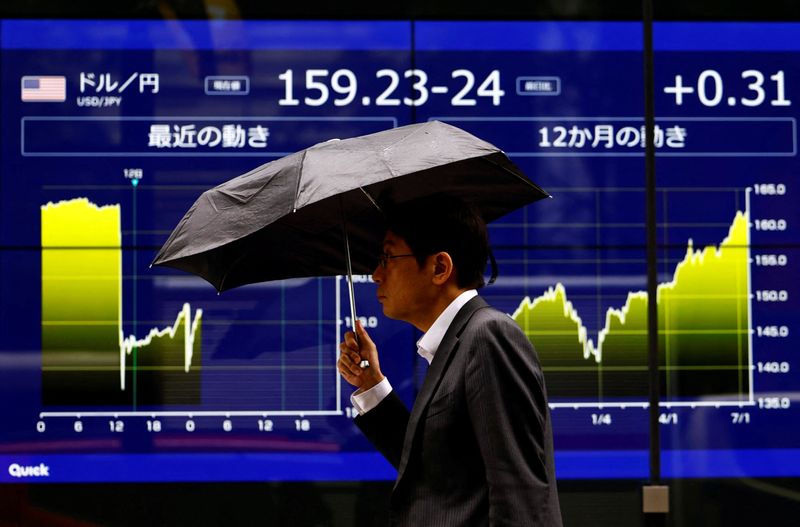By Jamie McGeever
(Reuters) - A look at the day ahead in Asian markets.
Asian markets on Tuesday will be hoping to rebound from Monday's fairly lackluster start to the week, with Japanese equities particularly well-positioned to move up a gear or two after the yen slid to its lowest level in nearly three months.
The dollar leaped nearly 1% to 150.90 yen, its highest since Aug. 1. It was the most notable aspect of the greenback's broad rise on Monday to its strongest level against a basket of major currencies in nearly three months.
The yen's correlation with Japanese stocks has turned deeply negative over the past month or so, meaning when the yen weakens stocks tend to rise, and vice versa.
The simple rolling 25-day correlation between dollar/yen and the Nikkei 225 index is now the most inverse since 2005. On that basis, the yen's latest dip should mean a leg up for the Nikkei, right?
A buoyant dollar, however, is not good news for emerging markets, especially when accompanied by rising Treasury yields. And U.S. bond yields are rising.
The 10-year yield rose 11 basis points to a three-month high of 4.19% on Monday. Inflation concerns? Debt and deficit concerns? Election concerns? Strong growth? Whatever the mix, it is a tightening of financial conditions that is often a red flag for emerging markets.
According to Bespoke Investment Group, of the 35 times the Fed has cut rates since 1994, the increase of more than 50 bps in the 10-year yield after the most recent cut ranks as the third largest.
Chinese markets have had a positive start to the week after the People's Bank of China cut benchmark lending rates by 25 bps and after Beijing flagged new measures to support innovative tech companies.
Export figures from Taiwan were a reminder, however, of China's economic predicament. Export orders in September fell short of expectations due to faltering demand from top trading partner China.
Tuesday's calendar in Asia is light, with Hong Kong consumer inflation, South Korean producer price inflation and New Zealand trade the main highlights.
Pipeline price pressures in South Korea appear to be cooling pretty rapidly. Annual PPI in August slumped to 1.6% from 2.6% in July - the steepest month-to-month fall since May last year - and monthly PPI has been negative in two of the last three months.
The International Monetary Fund and World Bank October meetings get underway in Washington, with finance ministry and central bank officials from around the world descending on the U.S. capital to discuss economic and policy issues.
There will be a flurry of press conferences, panel discussions and bilateral meetings over the coming days that will undoubtedly yield market-moving headlines.
Here are key developments that could provide more direction to markets on Tuesday:
- Hong Kong consumer price inflation (September)

- South Korea producer price inflation (September)
- Reserve Bank of New Zealand assistant governor Karen Silk speaks